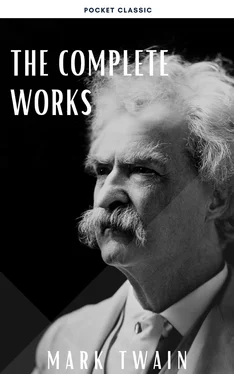The woman was mightily puzzled; but she did not give up. As she proceeded with her cooking, she set herself to contriving devices to surprise the boy into betraying his real secret. She talked about cattle—he showed no concern; then about sheep—the same result: so her guess that he had been a shepherd boy was an error; she talked about mills; and about weavers, tinkers, smiths, trades and tradesmen of all sorts; and about Bedlam, and jails, and charitable retreats: but no matter, she was baffled at all points. Not altogether, either; for she argued that she had narrowed the thing down to domestic service. Yes, she was sure she was on the right track, now; he must have been a house servant. So she led up to that. But the result was discouraging. The subject of sweeping appeared to weary him; fire-building failed to stir him; scrubbing and scouring awoke no enthusiasm. The goodwife touched, with a perishing hope, and rather as a matter of form, upon the subject of cooking. To her surprise, and her vast delight, the King's face lighted at once! Ah, she had hunted him down at last, she thought; and she was right proud, too, of the devious shrewdness and tact which had accomplished it.
Her tired tongue got a chance to rest, now; for the King's, inspired by gnawing hunger and the fragrant smells that came from the sputtering pots and pans, turned itself loose and delivered itself up to such an eloquent dissertation upon certain toothsome dishes, that within three minutes the woman said to herself, "Of a truth I was right—he hath holpen in a kitchen!" Then he broadened his bill of fare, and discussed it with such appreciation and animation, that the goodwife said to herself, "Good lack! how can he know so many dishes, and so fine ones withal? For these belong only upon the tables of the rich and great. Ah, now I see! ragged outcast as he is, he must have served in the palace before his reason went astray; yes, he must have helped in the very kitchen of the King himself! I will test him."
Full of eagerness to prove her sagacity, she told the King to mind the cooking a moment—hinting that he might manufacture and add a dish or two, if he chose; then she went out of the room and gave her children a sign to follow after. The King muttered—
"Another English king had a commission like to this, in a bygone time—it is nothing against my dignity to undertake an office which the great Alfred stooped to assume. But I will try to better serve my trust than he; for he let the cakes burn."
The intent was good, but the performance was not answerable to it, for this King, like the other one, soon fell into deep thinkings concerning his vast affairs, and the same calamity resulted—the cookery got burned. The woman returned in time to save the breakfast from entire destruction; and she promptly brought the King out of his dreams with a brisk and cordial tongue-lashing. Then, seeing how troubled he was over his violated trust, she softened at once, and was all goodness and gentleness toward him.
The boy made a hearty and satisfying meal, and was greatly refreshed and gladdened by it. It was a meal which was distinguished by this curious feature, that rank was waived on both sides; yet neither recipient of the favour was aware that it had been extended. The goodwife had intended to feed this young tramp with broken victuals in a corner, like any other tramp or like a dog; but she was so remorseful for the scolding she had given him, that she did what she could to atone for it by allowing him to sit at the family table and eat with his betters, on ostensible terms of equality with them; and the King, on his side, was so remorseful for having broken his trust, after the family had been so kind to him, that he forced himself to atone for it by humbling himself to the family level, instead of requiring the woman and her children to stand and wait upon him, while he occupied their table in the solitary state due to his birth and dignity. It does us all good to unbend sometimes. This good woman was made happy all the day long by the applauses which she got out of herself for her magnanimous condescension to a tramp; and the King was just as self-complacent over his gracious humility toward a humble peasant woman.
When breakfast was over, the housewife told the King to wash up the dishes. This command was a staggerer, for a moment, and the King came near rebelling; but then he said to himself, "Alfred the Great watched the cakes; doubtless he would have washed the dishes too—therefore will I essay it."
He made a sufficiently poor job of it; and to his surprise too, for the cleaning of wooden spoons and trenchers had seemed an easy thing to do. It was a tedious and troublesome piece of work, but he finished it at last. He was becoming impatient to get away on his journey now; however, he was not to lose this thrifty dame's society so easily. She furnished him some little odds and ends of employment, which he got through with after a fair fashion and with some credit. Then she set him and the little girls to paring some winter apples; but he was so awkward at this service that she retired him from it and gave him a butcher knife to grind.
Afterwards she kept him carding wool until he began to think he had laid the good King Alfred about far enough in the shade for the present in the matter of showy menial heroisms that would read picturesquely in story-books and histories, and so he was half-minded to resign. And when, just after the noonday dinner, the goodwife gave him a basket of kittens to drown, he did resign. At least he was just going to resign—for he felt that he must draw the line somewhere, and it seemed to him that to draw it at kitten-drowning was about the right thing—when there was an interruption. The interruption was John Canty—with a peddler's pack on his back—and Hugo.
The King discovered these rascals approaching the front gate before they had had a chance to see him; so he said nothing about drawing the line, but took up his basket of kittens and stepped quietly out the back way, without a word. He left the creatures in an out-house, and hurried on, into a narrow lane at the rear.
The Prince and the hermit
The high hedge hid him from the house, now; and so, under the impulse of a deadly fright, he let out all his forces and sped toward a wood in the distance. He never looked back until he had almost gained the shelter of the forest; then he turned and descried two figures in the distance. That was sufficient; he did not wait to scan them critically, but hurried on, and never abated his pace till he was far within the twilight depths of the wood. Then he stopped; being persuaded that he was now tolerably safe. He listened intently, but the stillness was profound and solemn—awful, even, and depressing to the spirits. At wide intervals his straining ear did detect sounds, but they were so remote, and hollow, and mysterious, that they seemed not to be real sounds, but only the moaning and complaining ghosts of departed ones. So the sounds were yet more dreary than the silence which they interrupted.
It was his purpose, in the beginning, to stay where he was the rest of the day; but a chill soon invaded his perspiring body, and he was at last obliged to resume movement in order to get warm. He struck straight through the forest, hoping to pierce to a road presently, but he was disappointed in this. He travelled on and on; but the farther he went, the denser the wood became, apparently. The gloom began to thicken, by-and-by, and the King realised that the night was coming on. It made him shudder to think of spending it in such an uncanny place; so he tried to hurry faster, but he only made the less speed, for he could not now see well enough to choose his steps judiciously; consequently he kept tripping over roots and tangling himself in vines and briers.
Читать дальше










